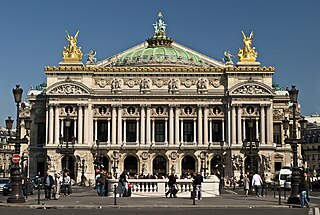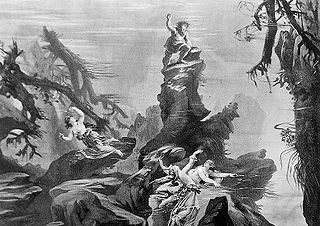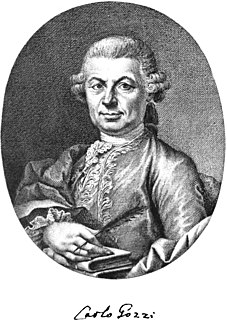Related Research Articles

Carlo Osvaldo Goldoni was an Italian playwright and librettist from the Republic of Venice. His works include some of Italy's most famous and best-loved plays. Audiences have admired the plays of Goldoni for their ingenious mix of wit and honesty. His plays offered his contemporaries images of themselves, often dramatizing the lives, values, and conflicts of the emerging middle classes. Though he wrote in French and Italian, his plays make rich use of the Venetian language, regional vernacular, and colloquialisms. Goldoni also wrote under the pen name and title Polisseno Fegeio, Pastor Arcade, which he claimed in his memoirs the "Arcadians of Rome" bestowed on him.

Opera is a form of theatre in which music has a leading role and the parts are taken by singers, but is distinct from musical theatre. Such a "work" is typically a collaboration between a composer and a librettist and incorporates a number of the performing arts, such as acting, scenery, costume, and sometimes dance or ballet. The performance is typically given in an opera house, accompanied by an orchestra or smaller musical ensemble, which since the early 19th century has been led by a conductor.

Wilhelm Richard Wagner was a German composer, theatre director, polemicist, and conductor who is chiefly known for his operas. Unlike most opera composers, Wagner wrote both the libretto and the music for each of his stage works. Initially establishing his reputation as a composer of works in the romantic vein of Carl Maria von Weber and Giacomo Meyerbeer, Wagner revolutionised opera through his concept of the Gesamtkunstwerk, by which he sought to synthesise the poetic, visual, musical and dramatic arts, with music subsidiary to drama. He described this vision in a series of essays published between 1849 and 1852. Wagner realised these ideas most fully in the first half of the four-opera cycle Der Ring des Nibelungen.

Der Ring des Nibelungen, WWV 86, is a cycle of four German-language epic music dramas composed by Richard Wagner. The works are based loosely on characters from Norse sagas and the Nibelungenlied. The composer termed the cycle a "Bühnenfestspiel", structured in three days preceded by a Vorabend. It is often referred to as the Ring cycle, Wagner's Ring, or simply The Ring.

Das Rheingold, WWV 86A, is the first of the four music dramas that constitute Richard Wagner's Der Ring des Nibelungen,. It was performed, as a single opera, at the National Theatre Munich on 22 September 1869, and received its first performance as part of the Ring cycle at the Bayreuth Festspielhaus, on 13 August 1876.
A leitmotif or leitmotiv is a "short, recurring musical phrase" associated with a particular person, place, or idea. It is closely related to the musical concepts of idée fixe or motto-theme. The spelling leitmotif is an anglicization of the German Leitmotiv, literally meaning "leading motif", or "guiding motif". A musical motif has been defined as a "short musical idea ... melodic, harmonic, or rhythmic, or all three", a salient recurring figure, musical fragment or succession of notes that has some special importance in or is characteristic of a composition: "the smallest structural unit possessing thematic identity."
This article contains information about the literary events and publications of 1761.
This article contains information about the literary events and publications of 1762.
This article presents lists of the literary events and publications in 1765.
This article contains information about the literary events and publications of 1786.

John Crowe Ransom was an American educator, scholar, literary critic, poet, essayist and editor. He is considered to be a founder of the New Criticism school of literary criticism. As a faculty member at Kenyon College, he was the first editor of the widely regarded Kenyon Review. Highly respected as a teacher and mentor to a generation of accomplished students, he also was a prize-winning poet and essayist.

Carlo, Count Gozzi was a Venetian playwright and champion of Commedia dell'arte.

Thomas Schippers was an American conductor. He was highly regarded for his work in opera.
William Fense Weaver was an English language translator of modern Italian literature.

Turandot (1762) is a commedia dell'arte play by Count Carlo Gozzi after a supposedly Persian story from the collection Les Mille et un jours (1710–1712) by François Pétis de la Croix. Gozzi's Turandot was first performed at the Teatro San Samuele, Venice, on 22 January 1762.

The Consul is an opera in three acts with music and libretto by Gian Carlo Menotti, his first full-length opera.
Literaturoper, a term coined by the German music critic Edgar Istel, describes a genre of opera that emerged during the late 19th century. When an existing play for the legitimate theatre is set to music without major changes and without the intervention of a librettist, a “Literaturoper” is the result. Although the term is German, it can be applied to any kind of opera, irrespective of style or language.

Jean Madeira, née Jean Browning was an American contralto, particularly known for her work in late-romantic German repertoire such as the operas of Richard Wagner and Richard Strauss.

Alphonse Royer, was a French author, dramatist and theatre manager, most remembered today for having written the librettos for Gaetano Donizetti's opera La favorite and Giuseppe Verdi's Jérusalem. From 1853 to 1856, he was the director of the Odéon Theatre and from 1856 to 1862 director of the Paris Opéra, after which he was appointed France's Inspecteur Général des Beaux-Arts. In his later years, he wrote a six volume history of the theatre and a history of the Paris Opéra. He also translated the theatrical works of the Italian dramatist Carlo Gozzi, as well those of the Spanish writers, Miguel de Cervantes, Tirso de Molina, and Juan Ruiz de Alarcón. A Chevalier and later Officier of the Légion d'honneur, Royer died in Paris, the city of his birth, at the age of 71.
Herbert Wilson Beattie was an American operatic bass and voice teacher.
References
- ↑ DiGaetani, John Louis, "Richard Wagner: The Last of the Titans (review)", The Opera Quarterly, Volume 21, Number 2, Spring 2005, pp. 380-382
- ↑ Buller, Jeffrey L., "Wagner and Suicide (review)", The Opera Quarterly, Volume 21, Number 2, Spring 2005, pp. 376-380